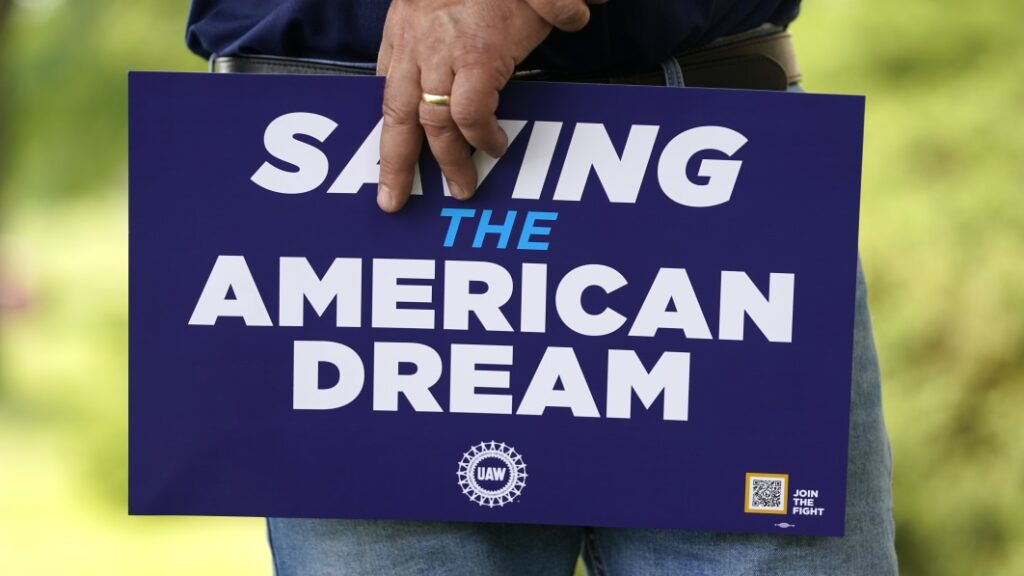UAW seeks Washington pressure on Detroit automakers in labor talks

WASHINGTON – United Auto Workers President Shawn Fain has made winning the support of Washington a key part of the union’s strategy to nail down new labor deals with the Detroit Three automakers.
Part of that approach includes a decision by the UAW to hold off on endorsing U.S. President Joe Biden’s re-election campaign, in a move to pressure the administration, industry executives and analysts said. U.S. unions are making bolder contract demands in the tighter labor market.
Fain, who represents 150,000 U.S. hourly workers at General Motors, Ford Motor and Chrysler parent Stellantis, came to Washington on Wednesday, a day after opening talks with GM, to meet with lawmakers and make the case that the union’s demands are reasonable.
Fain gave a slide presentation to lawmakers as he argued workers’ compensation has not kept up with the nearly $250 billion in North American profit raked in by the three automakers over the last decade.
“It’s a very uneven playing field right now,” Fain told Reuters on Wednesday after one meeting. “Our workers have regressed. We’ve got to do better.”
The Detroit Three automakers have said they want to compensate fairly their hourly workers, but also have stressed a need for greater cost competitiveness as the industry shifts to electric vehicles, a market dominated by Tesla.
“The best way to provide job security for our 50,000 manufacturing employees is by keeping General Motors financially strong,” GM manufacturing chief Gerald Johnson said in a video the automaker released on Wednesday on a website dedicated to the UAW talks.
The Detroit Three automakers rely on representatives in Washington to lobby for their positions.
Biden also faces pressure from former President Donald Trump, who is seeking the Republican presidential nomination in 2024. On Thursday, Trump said Biden was “waging war on the U.S. auto industry” through “crippling” EV mandates and urged the UAW to endorse him.
Biden’s campaign responded by saying Trump was “the most anti-union president in modern history, stacking his cabinet with anti-union officials.” It added that under Biden, “more than 120,000 auto manufacturing jobs have come back to the United States, and new auto factories are popping up across the country.”
Meanwhile, Fain has not ruled out striking all three Detroit automakers. A strike of all three could have major economic impacts and Washington could come under heavy pressure to intervene.
In 2019, GM’s fourth-quarter profit took a $3.6 billion hit from a 40-day UAW strike that shut down U.S. operations.
“Some of the slides really show how much workers have back-slid while compensation for the top executives is continuing to increase,” said U.S. Representative Pramila Jayapal, a Democrat who took part in a labor caucus meeting with Fain.
She said automakers cannot use an old formula to win labor deals by simply promising a new plant or employment.
“It can’t just be more jobs in America. They need to be union jobs,” Jayapal said.
WAKE-UP CALL
The UAW has made the fate of Detroit Three joint-venture battery plants a key focus. The automakers have emphasized that the unionization of those plants not wholly owned by the companies is up to the affected workers.
Representative Donald Norcross, a Democrat from New Jersey, said workers across the economy need higher wages and benefits.
“They are going to get a big wake-up call,” Norcross said of the Detroit Three. “There’s a reckoning that people ought to be able to take care of their families.”
Harley Shaiken, a labor professor at the University of California, Berkeley, said the UAW is making the case that its goals are reasonable and that members will strike if they do not achieve them. This, he said, sets the stage “for ways in which political leaders could exert pressure on the Detroit automakers, who need all kinds of things from the federal government.”
Fain met White House officials on Wednesday to discuss the union’s bargaining positions, including a brief meeting with Biden.
Fain also met with Senate Democratic Leader Chuck Schumer and fellow Democratic senators Dick Durbin, Sherrod Brown, Gary Peters, Debbie Stabenow and Bob Casey, as well as Acting Labor Secretary Julie Su, a union official said. Other meetings were scheduled for the rest of the week.
Fain not only has broken with most major U.S. labor unions in not yet endorsing Biden for re-election, but has also panned some administration policies on electric vehicles.
Last month, Fain harshly criticized the U.S. Energy Department plan to lend $9.2 billion to a joint venture of Ford and South Korea’s SK Innovation to build three U.S. battery plants, citing the lower wages paid to workers that are typically not union-represented.
After a meeting with Fain in April, Senator Bernie Sanders, an independent from Vermont who caucuses with Democrats, criticized a GM-LG Energy Solution joint-venture battery plant for paying workers much less than GM assembly plant employees even though GM benefits from hefty U.S. government tax credits. The same program funded Ford.
(Reporting by David Shepardson in Washington; Additional reporting by Ben Klayman in Detroit; Editing by Matthew Lewis)



